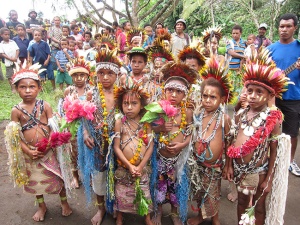 A proactive team from James Cook University is currently working in Papua New Guinea to develop an eco-tourism industry around the Papuan Black Bass, one of the world's toughest sportsfish.
A proactive team from James Cook University is currently working in Papua New Guinea to develop an eco-tourism industry around the Papuan Black Bass, one of the world's toughest sportsfish.The flag of Papua New Guinea was adopted on July 1, 1971. In the hoist, it depicts the Southern Cross; in the fly, a raggiana bird of paradise is silhouetted.
Port Moresby, Capital of Papua New Guinea.
Water falls are some of Papua New Guinea's attractions.
Papua Guinea is not only an island but is also a territory of fully independent people thus calling the island the Republic of Papua Guinea.
Culture Diversity, Colors, Culture Face, Annual Festivals, Traditional Dance, Traditional Costumes, Singing Dance.
 A proactive team from James Cook University is currently working in Papua New Guinea to develop an eco-tourism industry around the Papuan Black Bass, one of the world's toughest sportsfish.
A proactive team from James Cook University is currently working in Papua New Guinea to develop an eco-tourism industry around the Papuan Black Bass, one of the world's toughest sportsfish.
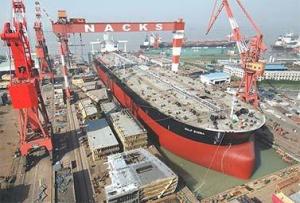 More than 5000 participants of the financial education program, graduated in Madang, most of them mothers from nearby villages. Banking the unbanked is an endeavour by the Central Bank of PNG, the Asian Development Bank, the Australian Government and the Government of PNG.
More than 5000 participants of the financial education program, graduated in Madang, most of them mothers from nearby villages. Banking the unbanked is an endeavour by the Central Bank of PNG, the Asian Development Bank, the Australian Government and the Government of PNG.
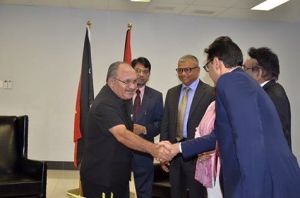 Papua New Guinea Prime Minister Peter O’Neill has greeted a business delegation from the Confederation of Indian Investment (CII) that was undertaking its first ever exploratory visit for enriched bilateral ties with Papua New Guinea.
Papua New Guinea Prime Minister Peter O’Neill has greeted a business delegation from the Confederation of Indian Investment (CII) that was undertaking its first ever exploratory visit for enriched bilateral ties with Papua New Guinea.
 The PGA Tour of Australasia will discover new territories in 2016 as it heads up to Papua New Guinea for the first time. The South Pacific Export Radler PNG Open will become a fully-fledged PGA Tour of Australasia tournament after many years of being an effective pro-am event.
The PGA Tour of Australasia will discover new territories in 2016 as it heads up to Papua New Guinea for the first time. The South Pacific Export Radler PNG Open will become a fully-fledged PGA Tour of Australasia tournament after many years of being an effective pro-am event.
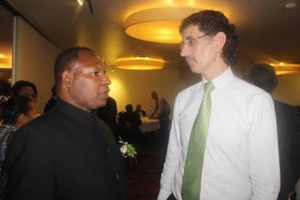 Papua New Guinea’s current bank legislation can be altered to safeguard that banks redirect their investment focus towards Papua New Guinea’s renewable sectors, according to Trade Minister, Richard Maru. Minister Maru says this would require banks in PNG to capitalize a certain percentage of their revenue, into agriculture, fisheries, Small to Medium Enterprises, SMEs, and tourism.
Papua New Guinea’s current bank legislation can be altered to safeguard that banks redirect their investment focus towards Papua New Guinea’s renewable sectors, according to Trade Minister, Richard Maru. Minister Maru says this would require banks in PNG to capitalize a certain percentage of their revenue, into agriculture, fisheries, Small to Medium Enterprises, SMEs, and tourism.
 For businesses in any industry, the key to victory is knowing and understanding your audience. Social media makes this conceivable, and easier to achieve than ever. With tools like Facebook and LinkedIn, you can study the dominant languages spoken among your social media audience, as well as their age and gender.
For businesses in any industry, the key to victory is knowing and understanding your audience. Social media makes this conceivable, and easier to achieve than ever. With tools like Facebook and LinkedIn, you can study the dominant languages spoken among your social media audience, as well as their age and gender.
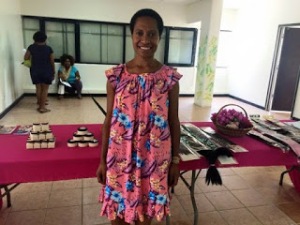 Encouraging PNG Business is significant in getting the people more involved in business activities that can assist nurture the country’s economy.
Encouraging PNG Business is significant in getting the people more involved in business activities that can assist nurture the country’s economy.
 According to High Commissioner to Papua New Guinea Jilid Kuminding, Malaysia is pleased with the growth of trade with PNG.
According to High Commissioner to Papua New Guinea Jilid Kuminding, Malaysia is pleased with the growth of trade with PNG.
 After a decade of increasing mineral reconnaissance activity, PNG mineral sector appears to have leaked in 2012.
After a decade of increasing mineral reconnaissance activity, PNG mineral sector appears to have leaked in 2012.
 Most of the nightlife in Papua New Guinea is limited to the capital of Port Moresby and the larger provincial centres. The larger hotels will generally have a weekend disco and there will often be a live band as well.
Most of the nightlife in Papua New Guinea is limited to the capital of Port Moresby and the larger provincial centres. The larger hotels will generally have a weekend disco and there will often be a live band as well.
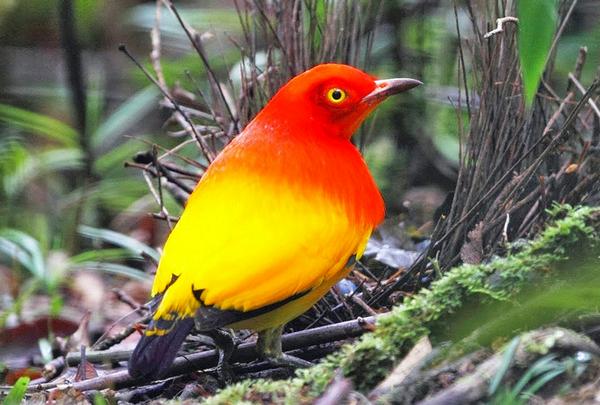 Papua New Guinea is a bird watchers paradise. There are many locations where beautiful species of birds are found, including the different species of the famous Birds of Paradise which only found in PNG.
Papua New Guinea is a bird watchers paradise. There are many locations where beautiful species of birds are found, including the different species of the famous Birds of Paradise which only found in PNG.
 In a quest to further lift and stimulate the existing ties between the Asian countries and the Pacific Region, authorities from Philippines and China have planned the commencement of a fruitful visit of 32 business delegations from the Philippines-Chinese Chamber of Commerce & Industry (PCCCI) to PNG this week.
In a quest to further lift and stimulate the existing ties between the Asian countries and the Pacific Region, authorities from Philippines and China have planned the commencement of a fruitful visit of 32 business delegations from the Philippines-Chinese Chamber of Commerce & Industry (PCCCI) to PNG this week.
 Latterly academic staff of Madang and Port Moresby campuses of Divine Word University (DWU) completed three weeks of training on online pedagogy in e-teaching and e-learning.
Latterly academic staff of Madang and Port Moresby campuses of Divine Word University (DWU) completed three weeks of training on online pedagogy in e-teaching and e-learning.
 PNG’s Trade Office in Taipei is a trademark event in the short history of Papua New Guinea's trade and economic relations with Taiwan as delineate by the Papua New Guinea Prime Minister, Peter O’Neill. “The Opening of the Papua New Guinea Trade Office in Taipei compliments the Taiwan Trade Mission in Papua New Guinea which is an important source of trade and investment,” the Prime Minister said. The Prime Minister said Minister Maru will also assist as the important fleck through this Trade Office and forge ahead to pursue new connections for trade and investments, technical cooperation and innovation, as well as advancing people-to-people connections.
PNG’s Trade Office in Taipei is a trademark event in the short history of Papua New Guinea's trade and economic relations with Taiwan as delineate by the Papua New Guinea Prime Minister, Peter O’Neill. “The Opening of the Papua New Guinea Trade Office in Taipei compliments the Taiwan Trade Mission in Papua New Guinea which is an important source of trade and investment,” the Prime Minister said. The Prime Minister said Minister Maru will also assist as the important fleck through this Trade Office and forge ahead to pursue new connections for trade and investments, technical cooperation and innovation, as well as advancing people-to-people connections.